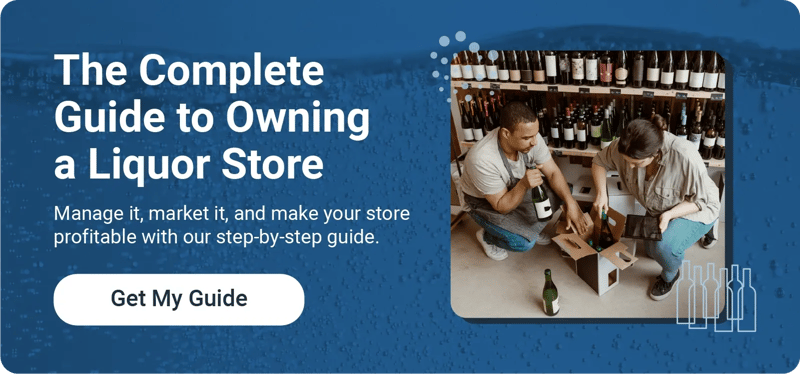Owning a liquor store can feel like having multiple jobs all at once.
One moment, you’re in the back office playing the role of accountant, and the next, you’re on the sales floor, helping a customer curate the perfect selection of spirits for a party.
It’s exhausting — but it doesn’t have to be.
In this blog, we’ll explore some of the toughest challenges of owning a liquor store, plus the tools that can help you juggle these tough tasks with ease.
1. Protecting Your Liquor License
Staying compliant with the law is one of your biggest responsibilities as a liquor store owner. If you sell to underage customers or violate your state’s other alcohol regulations, you could face hefty fines, legal issues, or even the loss of your liquor license.
But when your to-do list and checkout lines get long, legal compliance might fall to the bottom of your priority list.
Solution: Invest in Age Verification Technology
Fortunately, age verification technology makes preventing underage sales and protecting your liquor license effortless.
This tool automatically prompts your employees to ask for ID during the checkout process, ensuring they never skip this crucial step. From there, your cashiers can manually enter customers’ birthdates into the system to ensure they’re over 21 or use an ID scanner to speed up the process.

2. Managing Liquor Inventory
Without the right tools and techniques, managing liquor inventory can be a nightmare. You’ll have no idea what’s on your shelves or in your storage room, constantly run out of your customers’ favorite bottles, and sink money into inventory you don’t need.
Plus, you and your team will spend countless hours on tedious (and often inaccurate) manual inventory counts.
Solution: Leverage Inventory Management Software
Liquor inventory management software saves you time and makes stocking your shelves a breeze.
This powerful tool tracks your inventory levels in real time, adjusting your stock records when inventory arrives at and leaves your store. This data helps you make more informed ordering decisions and avoid costly stockouts.
We recommend investing in inventory management software specifically designed for liquor stores. Look for features like case-breaking, which allows you to track and sell liquor by the case or bottle, and a centralized SKU database of common liquor products, which simplifies the onboarding process and makes it easier to expand your selection.
3. Tackling Tedious Tasks
As a small business owner, you’re highly susceptible to burnout. After all, you act as your liquor store’s accountant, inventory specialist, customer service expert, marketer, and more.
With so many responsibilities, it can be hard to play any of these roles well.
Solution: Upgrade Your POS System
The right point of sale (POS) system can do the heavy lifting on everyday tasks, helping you take on the most time-consuming challenges of owning a liquor store.
We recommend looking for a liquor store POS system with powerful automation tools like:
- Purchase order creation: This feature detects when you’re running low on a particular spirit and automatically generates a purchase order to replace it.
- Automated receiving: This feature automatically updates your inventory levels when you receive a new shipment of liquor.
- Product ranking: This feature analyzes your sales records to help you better understand your customers’ preferences and sales trends, giving each product an A to D ranking based on its performance.
In short, you can trust your POS system to handle crucial but repetitive tasks, giving you more time to serve customers and grow your business.
4. Achieving Profitability
As a liquor store owner, your number-one goal is to turn a profit.
Unfortunately, that’s easier said than done.
To achieve profitability, your store’s revenue must outweigh your operating expenses, so you need to track your costs, set appropriate prices, and ensure adequate inventory turnover.
Solution: Rely on Your POS System’s Sales Reports
The right liquor POS system is your best asset on the path toward liquor store profitability.
This powerful tool tracks your inventory expenses, allows you to adjust your prices in one easy place, and gives you a breakdown of your profit margin by item.
Instead of doing the math yourself, you can rely on your POS system’s sales reports to provide the insights you need to make informed, data-driven decisions to increase your store’s profitability.
Related read: Liquor Store Profit Margins: A Quick Guide for Liquor Store Owners

5. Attracting Customers
Above all, liquor store success hinges on one metric: the number of customers who come into your store and through your checkout line.
Marketing is one of the most intimidating challenges of owning a liquor store. You have to expand your reach to attract new customers, entice them to stop by and make a purchase, and then convert these one-time visitors into loyal shoppers.
Solution: Use Simple Marketing Tools
Marketing your liquor store might sound like a daunting task, but there are a few simple techniques that can help you attract and retain customers. Let’s take a look:
- Liquor promotions: Mix and match discounts and bundle deals can attract thrifty customers and increase your average basket size.
- Customer loyalty program: Launching a loyalty program rewards customers for shopping at your liquor store and encourages them to spend more during each visit.
- E-commerce: Selling liquor online can expand your reach, set your store apart from the competition, and increase your overall revenue.
A liquor POS system with built-in marketing tools makes implementing these strategies a breeze.
Tackle the Challenges of Owning a Liquor Store With Bottle POS
Struggling to overcome challenges like these? We have good news: There’s one simple tool that can help you tackle all of them.
Bottle POS is an all-in-one POS solution specifically designed to help liquor store owners like you stay compliant with the law, manage inventory, attract customers, and increase profits.
Our software includes all the features you need to run a successful liquor store with ease, including built-in age verification, liquor-specific inventory tracking, powerful automation tools, sales-boosting marketing features, advanced sales reporting, and more.
See how Bottle POS can solve your small business problems by scheduling a live, personalized demo with one of our liquor industry experts today.
















.png?width=264&height=280&name=transparent%20(1).png)